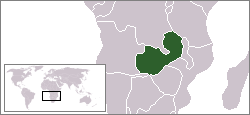Congo Pedicle: Difference between revisions
From Chalo Chatu, Zambia online encyclopedia
No edit summary |
|||
| Line 3: | Line 3: | ||
The Congo Pedicle is an example of the arbitrary boundaries<ref>Francis M. Deng: ''Africa and the New World Dis-Order: Rethinking Colonial Borders''. Brookings Review, Vol. 11, Spring 1993</ref> imposed by European powers on [[Africa]] in the wake of the [[Scramble for Africa]], which were "drawn by Europeans, for Europeans, and, apart from a some localized detail, paid scant regard to Africa, let alone Africans."<ref>Ieuan Griffiths: "The Scramble for Africa: Inherited Political Boundaries", ''The Geographical Journal'', Vol 152 No 2, July 1986, pp 204-216.</ref> | The Congo Pedicle is an example of the arbitrary boundaries<ref>Francis M. Deng: ''Africa and the New World Dis-Order: Rethinking Colonial Borders''. Brookings Review, Vol. 11, Spring 1993</ref> imposed by European powers on [[Africa]] in the wake of the [[Scramble for Africa]], which were "drawn by Europeans, for Europeans, and, apart from a some localized detail, paid scant regard to Africa, let alone Africans."<ref>Ieuan Griffiths: "The Scramble for Africa: Inherited Political Boundaries", ''The Geographical Journal'', Vol 152 No 2, July 1986, pp 204-216.</ref> | ||
==See also== | |||
*[[Luapula River]] | |||
*[[Luapula Province]] | |||
==References== | ==References== | ||
Revision as of 13:26, 26 July 2017
The Congo Pedicle (at one time referred to as the Zaire Pedicle; in French
la botte du Katanga
, meaning ‘Katanga boot’) refers to the southeast salient of the Katanga Province of the Democratic Republic of Congo which sticks into neighbouring Zambia, dividing it into two lobes. 'Pedicle' is used in the sense of 'a little foot'. 'Congo Pedicle' or 'the Pedicle' is also used to refer to the Congo Pedicle road which crosses it.
The Congo Pedicle is an example of the arbitrary boundaries[1] imposed by European powers on Africa in the wake of the Scramble for Africa, which were "drawn by Europeans, for Europeans, and, apart from a some localized detail, paid scant regard to Africa, let alone Africans."[2]
See also
References
<templatestyles src="Reflist/styles.css" />
